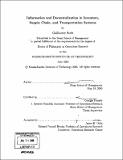| dc.contributor.advisor | Georgia Perakis. | en_US |
| dc.contributor.author | Roels, Guillaume | en_US |
| dc.contributor.other | Massachusetts Institute of Technology. Operations Research Center. | en_US |
| dc.date.accessioned | 2007-02-21T13:10:21Z | |
| dc.date.available | 2007-02-21T13:10:21Z | |
| dc.date.copyright | 2006 | en_US |
| dc.date.issued | 2006 | en_US |
| dc.identifier.uri | http://hdl.handle.net/1721.1/36228 | |
| dc.description | Thesis (Ph. D.)--Massachusetts Institute of Technology, Sloan School of Management, Operations Research Center, 2006. | en_US |
| dc.description | Includes bibliographical references (p. 199-213). | en_US |
| dc.description.abstract | This thesis investigates the impact of lack of information and decentralization of decision-making on the performance of inventory, supply chain, and transportation systems. In the first part of the thesis, we study two extensions of a classic single-item, single-period inventory control problem: the "newsvendor problem." We first analyze the newsvendor problem when the demand distribution is only partially specified by some moments and shape parameters. We determine order quantities that are robust, in the sense that they minimize the newsvendor's maximum regret about not acting optimally, and we compute the maximum value of additional information. The minimax regret approach is scalable to solve large practical problems, such as those arising in network revenue management, since it combines an efficient solution procedure with very modest data requirements. We then analyze the newsvendor problem when the inventory decision-making is decentralized. In supply chains, inventory decisions often result from complex negotiations among supply partners and might therefore lead to a loss of efficiency (in terms of profit loss). | en_US |
| dc.description.abstract | (cont.) We quantify the loss of efficiency of decentralized supply chains that use price-only contracts under the following configurations: series, assembly, competitive procurement, and competitive distribution. In the second part of the thesis, we characterize the dynamic nature of traffic equilibria in a transportation network. Using the theory of kinematic waves, we derive an analytical model for traffic delays capturing the first-order traffic dynamics and the impact of shock waves. We then incorporate the travel-time model within a dynamic user equilibrium setting and illustrate how the model applies to solve a large network assignment problem. | en_US |
| dc.description.statementofresponsibility | by Guillaume Roels. | en_US |
| dc.format.extent | 213 p. | en_US |
| dc.language.iso | eng | en_US |
| dc.publisher | Massachusetts Institute of Technology | en_US |
| dc.rights | M.I.T. theses are protected by copyright. They may be viewed from this source for any purpose, but reproduction or distribution in any format is prohibited without written permission. See provided URL for inquiries about permission. | en_US |
| dc.rights.uri | http://dspace.mit.edu/handle/1721.1/7582 | |
| dc.subject | Operations Research Center. | en_US |
| dc.title | Information and decentralization in inventory, supply chain, and transportation systems | en_US |
| dc.type | Thesis | en_US |
| dc.description.degree | Ph.D. | en_US |
| dc.contributor.department | Massachusetts Institute of Technology. Operations Research Center | |
| dc.contributor.department | Sloan School of Management | |
| dc.identifier.oclc | 76955036 | en_US |
